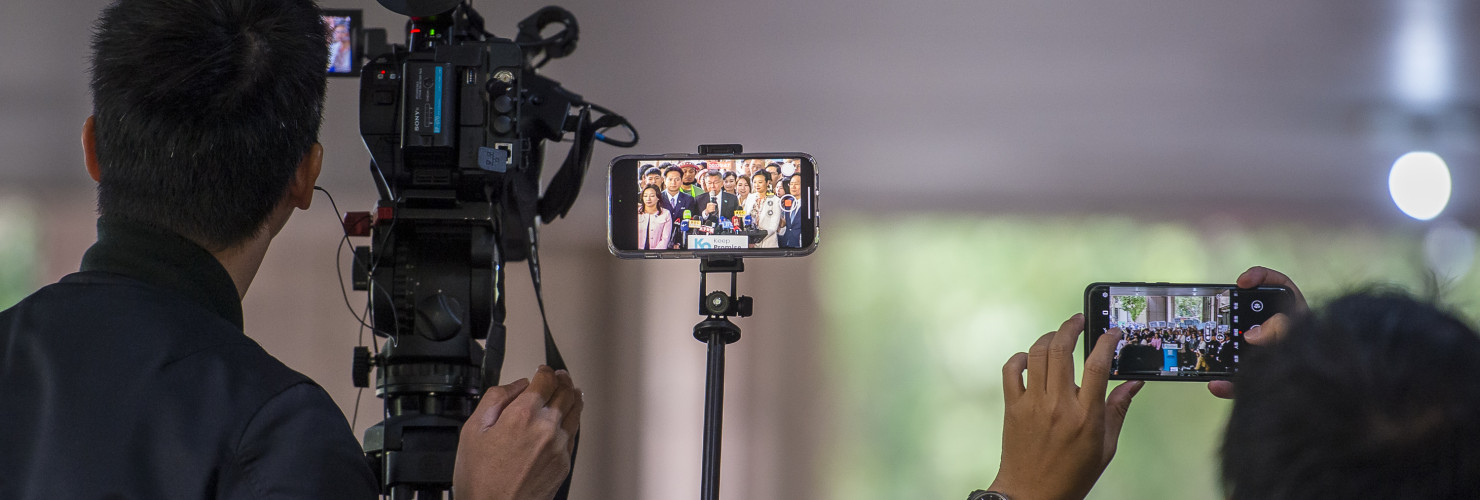

China’s coverage of Taiwan election shows Beijing stumped by Taiwanese identity
A growing distinctiveness challenges China’s ambition to peacefully unify both countries, says Sophie Reiß. It is instead threatening force and idealizing the future to keep its citizens onside. This article is part of our series on Taiwan’s 2024 presidential election.
China’s media coverage of the elections in Taiwan suggests that Beijing increasingly feels it cannot clear major hurdles in wooing Taiwan into unification: the formation of a distinct Taiwanese identity, fostered by what is now a tradition of democratic elections and growing international support. Lacking constructive alternatives, China’s media often resort to a mix of military threats, a turn-off for the audience in Taiwan, and rosy images of integration across the Taiwan Strait, aimed mainly at a domestic audience. Beijing appears to be switching from trying to win hearts and minds in Taiwan to keeping its own citizens onside.
China presents itself as a strong but amenable actor
Articles about Taiwan’s election do not appear prominently on Chinese news sites and are clearly outnumbered by more timeless, feel-good content on cross-Strait relations. The latter highlights cooperation, presents a positive outlook on Xi Jinping’s avowed “rejuvenation” of China, and Taiwan’s role therein, and situates this within Beijing’s version of the history of cross-Strait relations. China presents itself as a strong but amenable actor, willing to integrate “Taiwan compatriots.”
Election coverage, for its part, does not acknowledge Beijing’s problem that “Taiwan compatriots” are in the minority. A survey by Taiwan’s National Chengchi University (NCCU) in June 2023 found that 63 percent of respondents saw themselves as Taiwanese, almost twice the rate of those identifying as Taiwanese and Chinese or purely Chinese. But China’s media does criticize drivers of identity formation. An article in “Voice of Taiwan Strait” (海峡之声), a publication close to the People’s Liberation Army (PLA), calls Taiwan’s education system as “shameless” for neglecting ancient Chinese culture, described as “de-Sinicizing” the curriculum, so promoting independence.
Election coverage also makes no direct mention of how Taiwan’s political culture has helped distinguish it from China. When Taiwan held its first free and fair elections in 1996, NCCU polling shows that two thirds of the population saw itself as Taiwanese and Chinese or purely Chinese. But the proportion of those identifying as purely Taiwanese leapt by ten points to 34 percent within a year – and in 2009 surpassed the traditional majority claiming both Taiwanese and Chinese identity. Only 2.5 percent of Taiwanese today identify as Chinese.
Chinese articles about the election as a result downplay the contest as a “regional leader election” for “Taiwan compatriots” on the “island of Taiwan.” But the political parties do play a role in the coverage, even if their positions are often misrepresented. The ruling Democratic Progressive Party (DPP) is often scolded for promoting Taiwan independence, even if it states it only wants to maintain Taiwan’s current de-facto sovereignty; the major opposition party Kuomintang (KMT) and the four-year-old Taiwan People's Party (TPP) are described as being more prone to engaging with China and in consequence receive less criticism.
Taking these portrayals as given, one threatening article in the Global Times, the English-language mouthpiece of the Chinese Communist Party (CCP), describes the elections as a choice between “peace or war, prosperity or recession.” Another article quotes a Chinese Taiwan researcher as saying “the mainland has never attached hope on any single party for realizing reunification, as none of those politicians are fully reliable.” This underlines China’s unwillingness to engage with any Taiwanese government, regardless of the ruling party, that doesn’t want unification.
Articles warn Taiwan and third countries against intensifying cooperation
Election coverage also makes no direct mention of how Taiwan’s global economic and geopolitical ties have helped strengthen its position independent of China. Instead, articles warn Taiwan and third countries against intensifying cooperation. The focus here lies on the US, whose support for Taiwan China Daily describes as a geopolitical strategy to counter China and therefore unreliable protection for Taiwan: “What [the US] wants to do is to use the island as a card it can play to contain the development of the mainland.” Without saying so, Beijing obviously sees Taiwan’s position as a problem for its own plans for unification.
None of the articles about Taiwan’s election offer solutions to the challenges Beijing is facing and most end up threatening Taiwan with a forceful invasion. Many outlets don’t shy away from harsh wording alienating those in Taiwan sympathetic at least to closer economic cooperation. Although the articles often address actors in Taiwan directly, it is more likely that the main messages transported by China’s party-state affiliated media are meant for domestic consumption. The audience in China is meant to see the risks of threatening invasion in the light of the benefits of unification.
